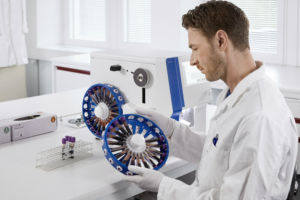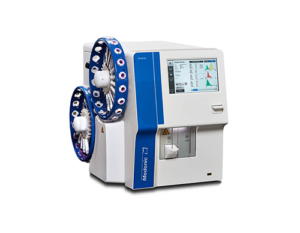Hematology analyzer design to minimize maintenance and service needs
Equipment maintenance and service means downtime, during which the analyzer is not available for providing patient results. Hematology systems intended for decentralized CBC testing pose special challenges to the engineers. The systems need to be robust to minimize maintenance and service calls, as such support can be at a far distance. These systems also need to be cost-efficient and simple to use, while providing laboratory-quality results.

Ashraf Gerges, Managing Director at MediServ Egypt, shares his first experience with the robustness of Boule hematology analyzers:
“In 2004, I was visiting a clinical lab inside a healthcare center related to the Faculty of Medicine of one of the biggest and oldest Universities in Egypt. Learning that I was a professional service engineer of CBC hematology analyzers, one of the laboratory physicians asked me if I could support one of their analyzers with reagents. She was referring to an analyzer of the Medonic brand, which I had previously not heard of.
I asked her who represented the brand in Egypt. She replied that the representative had disappeared three years ago and any attempts to find them had failed. As I observed that the instrument was in use, I asked here from where she got the reagents. She showed me the reagents beside the analyzer and explained that, although many non-original reagents available, these had shown to be the best option.
I then asked her who was technically maintaining and servicing the analyzer, but she said that, luckily, there had been no such needs over the past years since the representative disappeared. I was truly surprised that she had not required to make any service calls over three years, even though using a range of non-original reagents with the analyzer. When she confirmed, I told her that I would try my best to find a solution to the reagent supply problem.
MediServ was just initiating its business in Egypt when I started searching for the manufacturer of the Medonic analyzer to investigate the possibility of including the products in our catalogue. After two years of trying to reach the manufacturer, I discovered that Clinical Diagnostic Solutions, Inc. (CDS) distributed the same brand in the USA. Through CDS, I finally got in contact with Boule Sweden. I sent an enquiry to the Area Manager for Egypt. In 2006, we started doing business with Boule as the Egyptian representative for the Medonic analyzers, which in my point of view as a professional engineer having experience in almost all brands, are the best I have ever seen.”

Urban Trued, Hardware Development Manager at Boule, provides some of the reasons for why Boule analyzers require so little maintenance to perform:
“Boule analyzers feature a high precision shear valve to aspirate an exact amount of blood to obtain an accurate cell count. To minimize analyzer maintenance, the liquid system is driven by positive and negative air pressures using pumps. To be kept in excellent shape also in standby, the analyzer performs automated cleaning with diluent at regular intervals to prevent clogging of the fluidic system with protein sediments from the blood samples. Automated cleaning with diluent, which basically is a salt solution, will increase its consumption but, on the other hand, mitigate the need for daily cleanings with chemicals such as hypochlorite solution that are more harmful to the environment.”

Boule hematology systems are tailored for use in laboratories at small hospitals and primary care units. With a closed fluidic system and automated cleaning procedures, the analyzers are designed for a reliable performance to minimize maintenance and service needs, maximizing uptime and system availability to provide patient results.

